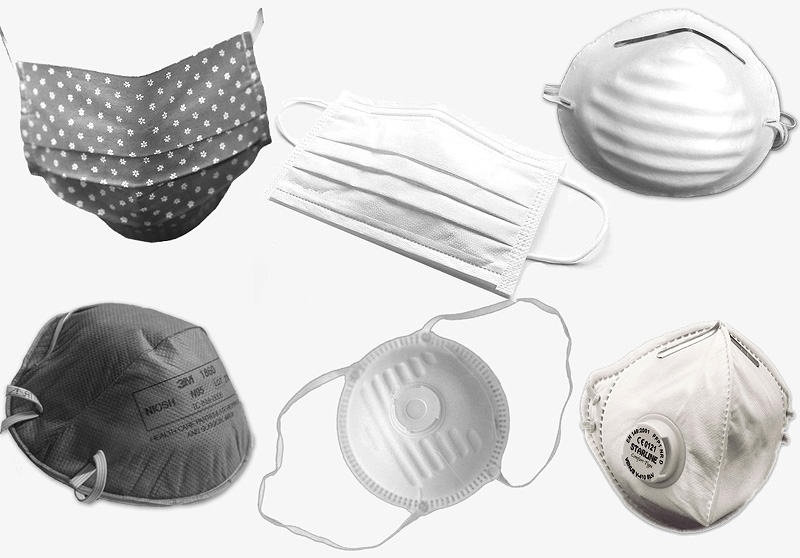 According to a study backed by the World Health Organization (WHO), face masks may help to reduce the spread of COVID-19 by as much as 85%. While we already know it’s important to wear a face mask properly, it is equally as critical to ensure that you wear the right kind of mask to begin with.
According to a study backed by the World Health Organization (WHO), face masks may help to reduce the spread of COVID-19 by as much as 85%. While we already know it’s important to wear a face mask properly, it is equally as critical to ensure that you wear the right kind of mask to begin with.
Do you know which type of mask is recommended for the most reliable protection against coronavirus exposure? If you’re not sure, here are some guidelines that can help you make the best decision about what type of face mask to wear for optimal comfort and safety.
- Firstly, the most effective type of mask for you to wear is one that you actually WILL wear. If your mask is ill-fitting, uncomfortable or inhibits your ability to breathe effectively, you’re far less likely to put it on as consistently as you should.A mask not worn protects no one; make sure you invest in a mask or masks that you can comfortably wear as often as is necessary.
-
Fabric or Cloth Masks
The Centers for Disease Control and Prevention (CDC) recommends cloth masks to help slow the spread of coronavirus. Cloth masks help to prevent the release of droplets from coughs, sneezes or even talking.
Cloth masks are beneficial because they’re easy to make or purchase even when there are shortages of other types of masks, and also because the level of comfort they provide makes them easily worn for longer periods of time when needed. A mask with at least 2 – 3 layers of fabric is recommended for optimal protection.
-
Surgical/Medical Masks
Surgical masks help block the release of large-particle droplets when coughing, sneezing or coughing. They’re intended for single use only, rather than being washed and re-worn as fabric masks would be.
This type of mask does not provide protection from small airborne particles and is therefore not considered respiratory protection. It is designed primarily to protect the wearer from sprays, splashes or splatters that may contain germs.
-
Paper Masks
While these masks can help to guard against non-toxic dusts such as those present when sweeping, dusting or mowing the yard, they provide no reliable respiratory protection from smaller, airborne particles.
For this reason, paper masks are not recommend for protection against COVID-19 exposure.
-
N95 Masks
These masks are designed to provide protection from small particles, non-oil aerosols and larger droplets that are expelled by sneezing, coaching or talking. (They are called N95 because they filter out at least 95% of airborne particles of all sizes.)
While these masks are effective in helping prevent coronavirus spread for both the wearer and others, current CDC guidance recommends that these masks should be reserved as critical supplies for healthcare workers and medical first responders on the ‘front lines’ of the pandemic when possible.
-
N95 Respirators
The CDC does not recommend the use of N95 respirators by the general public. While they are effective at fluid resistance and efficient filtration, an N95 respirator can make breathing more difficult, and should be reserved for professionals working in healthcare settings.
-
KN95 masks
In May 2020, the U.S. Food & Drug Administration (FDA) banned the use of KN95 masks from 60+ manufacturers in China, after evidence suggested that these masks were ineffective in preventing COVID-19 spread. (It was determined that these masks failed to filter out 95% of particles that 0.3 microns or larger, as is required for this mask type.)
Therefore, KN95 masks are not recommended for protection, unless purchased from the list of FDA-approved respirator manufacturers.
-
Face Masks with Valves
While these masks are effective at blocking respiratory droplets, they only provide protection for the wearer, who is still able to expel droplets out through the mask’s valves or vent.
In order to slow the pandemic, people should wear masks for the protection of themselves AND for others. Therefore, the CDC does not recommend the use of face masks with valves to prevent coronavirus spread.
If you don’t have a variety of mask options available to you, even a cloth face covering or bandana may help, when combined with proper social distancing and careful hand washing. Following these simple guidelines can go a long way toward helping stop the spread of COVID-19.
If You Live with Chronic Pain, You Can Feel Safe Visiting Our Pain Doctors
At Florida Pain Relief Centers, we take extensive precautions to protect our staff and patients from COVID-19 exposure. Our clinics are thoroughly sanitized, and we follow all recommended protocols for preventing the spread of the virus. So, you don’t have to suffer needlessly for fear of going out during the pandemic.
Let the expert pain management physicians at Florida Pain Relief Centers work with you to determine the cause of your pain and develop an individualized treatment plan to relieve your suffering. No matter what comes your way, you’ll be in a better position to cope with it once your pain is under control.
To consult with our pain specialists, call Florida Pain Relief Centers at 800.215.0029 or click the button below to schedule your visit online.

